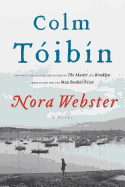
Irish novelist Colm Tóibín (Brooklyn; The Testament of Mary) captures the social tumult of late-'60s Ireland in Nora Webster, but the eponymous heroine's story is age-old and resonant. She's a young widow facing single motherhood in a fishbowl of a small town, struggling to forge a new life despite sympathetic but judgmental family and friends.
Nora's husband, Maurice, was beloved by all, a teacher and community leader who rescued her from a stifling family and reliably supported her and their four children. She is just 40 when he dies after a long illness, and "the problem for her was that she was on her own now and she had no idea how to live." Her girls are away at school, but her two young sons rely on her love and care. Helpful friends and relatives consistently insinuate themselves into her days. When she is invited to interview for an office job, she wonders who orchestrated it.
The children, her work and peaceful evenings satisfy Nora, but she does love music, something she and Maurice did not share. She joins the Gramophone Society and accepts an offer of singing lessons. As she embraces experiences she has created for herself, she acknowledges her strong will and comes into her own. The Troubles erupt, a union comes to town, her children grow into young adults, and Nora handles it all with quiet grace. Tóibín's protagonist is resilient and good but never ingratiating, admirable for her self-respect. --Cheryl Krocker McKeon, manager, Book Passage, San Francisco

